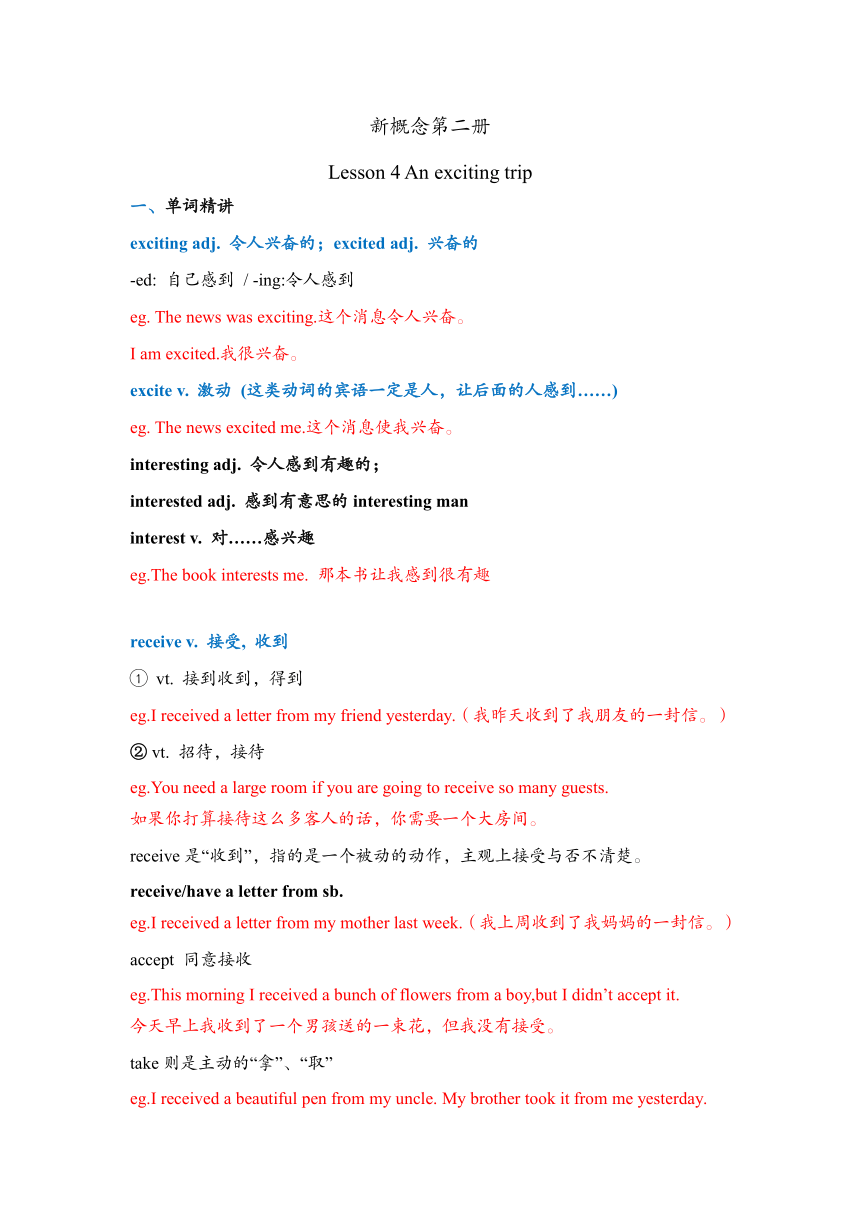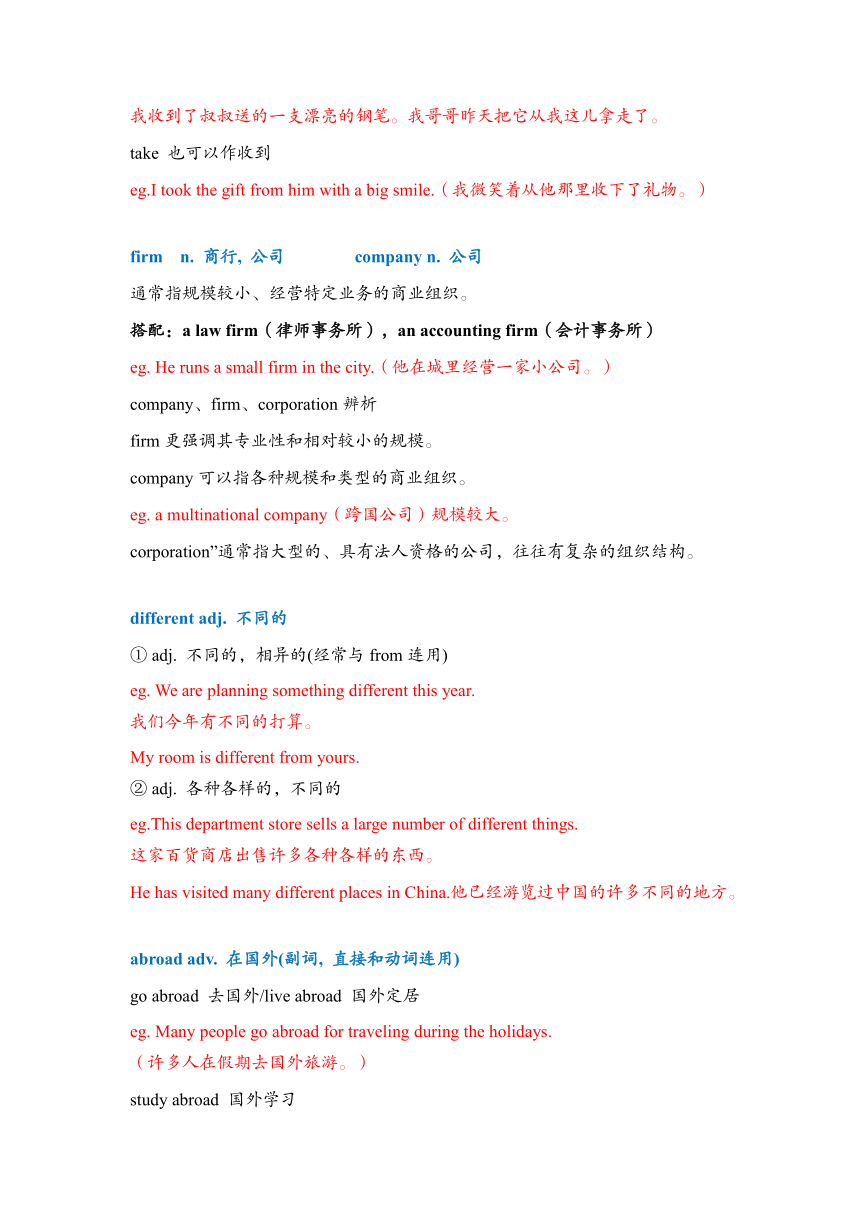新概念第二册Lesson 4 An exciting trip讲义
文档属性
| 名称 | 新概念第二册Lesson 4 An exciting trip讲义 |

|
|
| 格式 | docx | ||
| 文件大小 | 139.9KB | ||
| 资源类型 | 教案 | ||
| 版本资源 | 新概念英语 | ||
| 科目 | 英语 | ||
| 更新时间 | 2024-11-19 00:00:00 | ||
图片预览


文档简介
新概念第二册
Lesson 4 An exciting trip
单词精讲
exciting adj. 令人兴奋的;excited adj. 兴奋的
-ed: 自己感到 / -ing:令人感到
eg. The news was exciting.这个消息令人兴奋。
I am excited.我很兴奋。
excite v. 激动 (这类动词的宾语一定是人,让后面的人感到……)
eg. The news excited me.这个消息使我兴奋。
interesting adj. 令人感到有趣的;
interested adj. 感到有意思的interesting man
interest v. 对……感兴趣
eg.The book interests me. 那本书让我感到很有趣
receive v. 接受, 收到
vt. 接到收到,得到
eg.I received a letter from my friend yesterday.(我昨天收到了我朋友的一封信。)
② vt. 招待,接待
eg.You need a large room if you are going to receive so many guests.
如果你打算接待这么多客人的话,你需要一个大房间。
receive是“收到”,指的是一个被动的动作,主观上接受与否不清楚。
receive/have a letter from sb.
eg.I received a letter from my mother last week.(我上周收到了我妈妈的一封信。)
accept 同意接收
eg.This morning I received a bunch of flowers from a boy,but I didn’t accept it.
今天早上我收到了一个男孩送的一束花,但我没有接受。
take则是主动的“拿”、“取”
eg.I received a beautiful pen from my uncle. My brother took it from me yesterday.
我收到了叔叔送的一支漂亮的钢笔。我哥哥昨天把它从我这儿拿走了。
take 也可以作收到
eg.I took the gift from him with a big smile.(我微笑着从他那里收下了礼物。)
firm n. 商行, 公司 company n. 公司
通常指规模较小、经营特定业务的商业组织。
搭配:a law firm(律师事务所),an accounting firm(会计事务所)
eg. He runs a small firm in the city.(他在城里经营一家小公司。)
company、firm、corporation辨析
firm更强调其专业性和相对较小的规模。
company可以指各种规模和类型的商业组织。
eg. a multinational company(跨国公司)规模较大。
corporation”通常指大型的、具有法人资格的公司,往往有复杂的组织结构。
different adj. 不同的
① adj. 不同的,相异的(经常与from连用)
eg. We are planning something different this year.
我们今年有不同的打算。
My room is different from yours.
② adj. 各种各样的,不同的
eg.This department store sells a large number of different things.
这家百货商店出售许多各种各样的东西。
He has visited many different places in China.他已经游览过中国的许多不同的地方。
abroad adv. 在国外(副词, 直接和动词连用)
go abroad 去国外/live abroad 国外定居
eg. Many people go abroad for traveling during the holidays.
(许多人在假期去国外旅游。)
study abroad 国外学习
eg. She wants to study abroad to experience different cultures.
(她想要到国外学习以体验不同的文化。)
重点句型
定义:
现在完成时表示动作现存的结果,或者过去发生的事对现在的影响。
常与现在完成时连用的副词和副词短语:before (now)(以前);it’s the first time(第一次);so for(到目前为止);so far this morning(到上午为止);up to now(直到现在);up to the present(直到目前);just(刚刚);recently(最近);already(已经);lately(最近);now(现在);for 一段时间;since+时间;still(还;仍);at last(终于);finally(最终);疑问句和否定句中常用ever,yet,never,not…ever等。
eg. I’ve planted fourteen rose bushes so far this morning.
今天上午到目前为止我已经种了14株玫瑰丛了。
I have lived here for several years now and I’ve made many new friends since I have lived here.
我已经在这里住了好几年了,自从住在这里,我交了许多新朋友。
现在完成时还可和表示频度的副词连用,表示反复和习惯性动作,如often(经常),frequently(屡次),three times(三次)等。
eg.I’ve watched him on TV several times.我已经在电视上看过他好几次了。
结构:
肯定句:主语+have/has + 过去分词(v - ed形式)。
eg. She has finished her homework.(她已经完成她的作业了。)
否定句:主语+have/has+not+过去分词。
eg. I haven't seen him recently.(我最近没见到他。)
一般疑问句:Have/Has+主语+过去分词?
eg. Have you ever been to Paris (你去过巴黎吗?)
动词的过去分词变化规则
一般动词,在词尾直接加 - ed。
例如:work - worked,play - played。
以不发音的e结尾的动词,在词尾加 - d。
例如:live - lived,hope - hoped。
以“辅音字母 + y”结尾的动词,把y变为i,再加 - ed。
例如:study - studied,carry - carried。
重读闭音节且末尾只有一个辅音字母的动词,双写这个辅音字母,再加 - ed。
例如:stop - stopped,plan - planned。
课文精讲
I have just received a letter from my brother, Tim. He is in Australia.
[ 我刚刚收到弟弟蒂姆的来信,他正在澳大利亚。]
同位语:一个名词(或短语等)与另一个名词(或短语)并列而作为其说明或限定成分时称为同位语。同位语与它所补充说明的成分之间用逗号隔开。在译成汉语时,同位语或者插入主句中,或者另译为一句,很少像英语中那样用逗号隔开。
eg. This is John, one of my best friends. 这位是约翰。他是我最好的朋友之一。
Mrs. Smith, my neighbor, has never been abroad. 我的邻居史密斯夫人从来没有出过国。
He has been there for six months.
[ 他在那儿已经住了6个月了。]
I have arrived in Beijing. (arrive 是瞬间动词不能和段时间连用) has been + in地点
eg. He has been in Beijing for one year.
Tim is an engineer. He is working for a big firm and he has already visited a great number of different places in Australia. He has just bought an Australian car and has gone to Alice springs, a small town in the centre of Australia.
[蒂姆是个工程师,正在一家大公司工作,并且已经去过澳大利亚的不少地方了。他刚买了一辆澳大利亚小汽车,现在去了澳大利亚中部的小镇艾利斯斯普林斯。 ]
work for 在……上班/任职,强调work
eg. I am working for a school.
work in 强调地点(在哪个地方上班)
eg. I am working in the New Oriental school.
work at 上班
eg. She works at a department store.
a number of后面一定要加可数名词复数;通常number前有great,large,good,small,certain等形容词,数量大小也随之改变。a great number of 类似于, 约等于a lot of;
eg. A large/great number of our students are Danish.
a lot of 可加可数名词也可加不可数名词
He will soon visit Darwin. From there, he will fly to Perth.
[他不久还将到达尔文去,从那里,他再飞往珀斯。我弟弟以前从未出过国,因此,他觉得这次旅行非常激动人心。 ]
has gone to 去了某地没回来
eg. Tom has gone to Paris. He will be back next week.
(汤姆去了巴黎,他下周才回来。)
has been to 曾经去过某地, 现在不在那个地方
eg. He has been to Beijing several times.(他已经去过北京好几次了。)
My brother has never been abroad before, so he is finding this trip very exciting.
[我弟弟以前从未出过国,因此,他觉得这次旅行非常激动人心。]
before在句子后是副词, 译为“在此之前”,是现在完成时态的标志
find作“发现”、“发觉”讲时宾语往往带补足语(一般为形容词),说明宾语的状况、性质等。
find +宾语+形容词做宾补
find the room clean/find her happy
eg. When I entered the room, I found the room clean.
(当我进入房间时,我发现房间很干净。)
Every time I see her, I find her happy.(每次我看到她,我都发现她很开心。)
be finding在口语中经常使用
I’m finding… . . We’re finding… …
eg. I'm finding this book more and more interesting as I read on.
(随着我继续读下去,我逐渐发现这本书越来越有趣了。)
We're finding that living in the countryside has many advantages.
(我们逐渐发现住在乡下有很多优点。)
下面表示状态、感觉、情绪、精神活动的动词不可用于进行时:believe,doubt,see,hear,know,understand,belong,think,consider,feel,look,seem,show,mind,have,sound,taste,require,possess,care,like,hate,love,detest,desire
Lesson 4 An exciting trip
单词精讲
exciting adj. 令人兴奋的;excited adj. 兴奋的
-ed: 自己感到 / -ing:令人感到
eg. The news was exciting.这个消息令人兴奋。
I am excited.我很兴奋。
excite v. 激动 (这类动词的宾语一定是人,让后面的人感到……)
eg. The news excited me.这个消息使我兴奋。
interesting adj. 令人感到有趣的;
interested adj. 感到有意思的interesting man
interest v. 对……感兴趣
eg.The book interests me. 那本书让我感到很有趣
receive v. 接受, 收到
vt. 接到收到,得到
eg.I received a letter from my friend yesterday.(我昨天收到了我朋友的一封信。)
② vt. 招待,接待
eg.You need a large room if you are going to receive so many guests.
如果你打算接待这么多客人的话,你需要一个大房间。
receive是“收到”,指的是一个被动的动作,主观上接受与否不清楚。
receive/have a letter from sb.
eg.I received a letter from my mother last week.(我上周收到了我妈妈的一封信。)
accept 同意接收
eg.This morning I received a bunch of flowers from a boy,but I didn’t accept it.
今天早上我收到了一个男孩送的一束花,但我没有接受。
take则是主动的“拿”、“取”
eg.I received a beautiful pen from my uncle. My brother took it from me yesterday.
我收到了叔叔送的一支漂亮的钢笔。我哥哥昨天把它从我这儿拿走了。
take 也可以作收到
eg.I took the gift from him with a big smile.(我微笑着从他那里收下了礼物。)
firm n. 商行, 公司 company n. 公司
通常指规模较小、经营特定业务的商业组织。
搭配:a law firm(律师事务所),an accounting firm(会计事务所)
eg. He runs a small firm in the city.(他在城里经营一家小公司。)
company、firm、corporation辨析
firm更强调其专业性和相对较小的规模。
company可以指各种规模和类型的商业组织。
eg. a multinational company(跨国公司)规模较大。
corporation”通常指大型的、具有法人资格的公司,往往有复杂的组织结构。
different adj. 不同的
① adj. 不同的,相异的(经常与from连用)
eg. We are planning something different this year.
我们今年有不同的打算。
My room is different from yours.
② adj. 各种各样的,不同的
eg.This department store sells a large number of different things.
这家百货商店出售许多各种各样的东西。
He has visited many different places in China.他已经游览过中国的许多不同的地方。
abroad adv. 在国外(副词, 直接和动词连用)
go abroad 去国外/live abroad 国外定居
eg. Many people go abroad for traveling during the holidays.
(许多人在假期去国外旅游。)
study abroad 国外学习
eg. She wants to study abroad to experience different cultures.
(她想要到国外学习以体验不同的文化。)
重点句型
定义:
现在完成时表示动作现存的结果,或者过去发生的事对现在的影响。
常与现在完成时连用的副词和副词短语:before (now)(以前);it’s the first time(第一次);so for(到目前为止);so far this morning(到上午为止);up to now(直到现在);up to the present(直到目前);just(刚刚);recently(最近);already(已经);lately(最近);now(现在);for 一段时间;since+时间;still(还;仍);at last(终于);finally(最终);疑问句和否定句中常用ever,yet,never,not…ever等。
eg. I’ve planted fourteen rose bushes so far this morning.
今天上午到目前为止我已经种了14株玫瑰丛了。
I have lived here for several years now and I’ve made many new friends since I have lived here.
我已经在这里住了好几年了,自从住在这里,我交了许多新朋友。
现在完成时还可和表示频度的副词连用,表示反复和习惯性动作,如often(经常),frequently(屡次),three times(三次)等。
eg.I’ve watched him on TV several times.我已经在电视上看过他好几次了。
结构:
肯定句:主语+have/has + 过去分词(v - ed形式)。
eg. She has finished her homework.(她已经完成她的作业了。)
否定句:主语+have/has+not+过去分词。
eg. I haven't seen him recently.(我最近没见到他。)
一般疑问句:Have/Has+主语+过去分词?
eg. Have you ever been to Paris (你去过巴黎吗?)
动词的过去分词变化规则
一般动词,在词尾直接加 - ed。
例如:work - worked,play - played。
以不发音的e结尾的动词,在词尾加 - d。
例如:live - lived,hope - hoped。
以“辅音字母 + y”结尾的动词,把y变为i,再加 - ed。
例如:study - studied,carry - carried。
重读闭音节且末尾只有一个辅音字母的动词,双写这个辅音字母,再加 - ed。
例如:stop - stopped,plan - planned。
课文精讲
I have just received a letter from my brother, Tim. He is in Australia.
[ 我刚刚收到弟弟蒂姆的来信,他正在澳大利亚。]
同位语:一个名词(或短语等)与另一个名词(或短语)并列而作为其说明或限定成分时称为同位语。同位语与它所补充说明的成分之间用逗号隔开。在译成汉语时,同位语或者插入主句中,或者另译为一句,很少像英语中那样用逗号隔开。
eg. This is John, one of my best friends. 这位是约翰。他是我最好的朋友之一。
Mrs. Smith, my neighbor, has never been abroad. 我的邻居史密斯夫人从来没有出过国。
He has been there for six months.
[ 他在那儿已经住了6个月了。]
I have arrived in Beijing. (arrive 是瞬间动词不能和段时间连用) has been + in地点
eg. He has been in Beijing for one year.
Tim is an engineer. He is working for a big firm and he has already visited a great number of different places in Australia. He has just bought an Australian car and has gone to Alice springs, a small town in the centre of Australia.
[蒂姆是个工程师,正在一家大公司工作,并且已经去过澳大利亚的不少地方了。他刚买了一辆澳大利亚小汽车,现在去了澳大利亚中部的小镇艾利斯斯普林斯。 ]
work for 在……上班/任职,强调work
eg. I am working for a school.
work in 强调地点(在哪个地方上班)
eg. I am working in the New Oriental school.
work at 上班
eg. She works at a department store.
a number of后面一定要加可数名词复数;通常number前有great,large,good,small,certain等形容词,数量大小也随之改变。a great number of 类似于, 约等于a lot of;
eg. A large/great number of our students are Danish.
a lot of 可加可数名词也可加不可数名词
He will soon visit Darwin. From there, he will fly to Perth.
[他不久还将到达尔文去,从那里,他再飞往珀斯。我弟弟以前从未出过国,因此,他觉得这次旅行非常激动人心。 ]
has gone to 去了某地没回来
eg. Tom has gone to Paris. He will be back next week.
(汤姆去了巴黎,他下周才回来。)
has been to 曾经去过某地, 现在不在那个地方
eg. He has been to Beijing several times.(他已经去过北京好几次了。)
My brother has never been abroad before, so he is finding this trip very exciting.
[我弟弟以前从未出过国,因此,他觉得这次旅行非常激动人心。]
before在句子后是副词, 译为“在此之前”,是现在完成时态的标志
find作“发现”、“发觉”讲时宾语往往带补足语(一般为形容词),说明宾语的状况、性质等。
find +宾语+形容词做宾补
find the room clean/find her happy
eg. When I entered the room, I found the room clean.
(当我进入房间时,我发现房间很干净。)
Every time I see her, I find her happy.(每次我看到她,我都发现她很开心。)
be finding在口语中经常使用
I’m finding… . . We’re finding… …
eg. I'm finding this book more and more interesting as I read on.
(随着我继续读下去,我逐渐发现这本书越来越有趣了。)
We're finding that living in the countryside has many advantages.
(我们逐渐发现住在乡下有很多优点。)
下面表示状态、感觉、情绪、精神活动的动词不可用于进行时:believe,doubt,see,hear,know,understand,belong,think,consider,feel,look,seem,show,mind,have,sound,taste,require,possess,care,like,hate,love,detest,desire
同课章节目录
